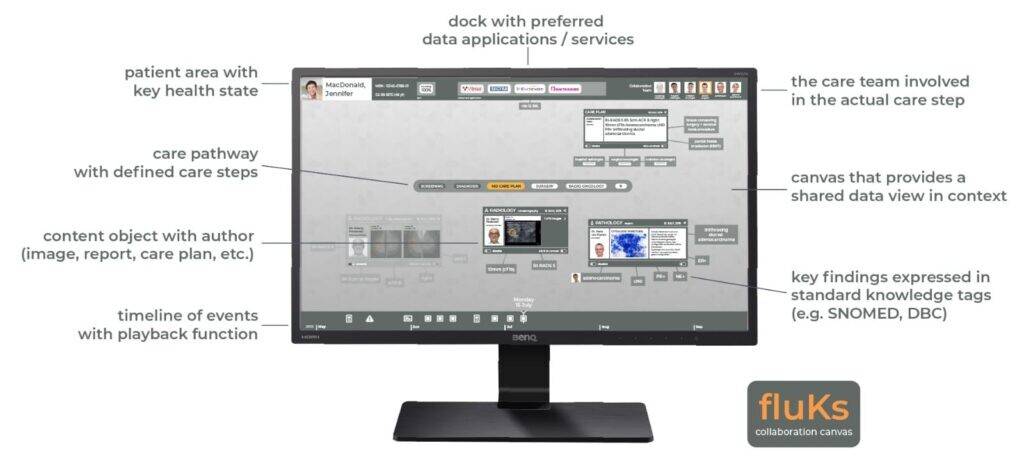How can you, as a physician, gain insight into your patient’s overall health situation in an ever‑growing folder system, with masses of letters and notes for every patient, not to mention the countless work lists, e-mails and separate systems where you have to search for the remainder of the information? How can you guarantee that you did not overlook that one crucial piece of data?
A lack of oversight and the possibility of quickly and easily sharing my clinical insights with colleagues is a daily medical mishap in my experience. I find that waiting until a solution presents itself is irresponsible, to say the least. That is why I rolled up my sleeves together with health care ICT specialists Han Kohar and Peter Walgemoed to help eliminate this problem. Together we worked out the concept for ‘fluKs Collaborative Space’, a virtual conference room for health care professionals with global scalability.
Freedom of communication and application
Imagine a digital bulletin board where all the members of your treatment team can share their insights about a mutual patient/client, from the initial contact to the implementation of the treatment plan. Insights that can be easily linked to the results of tests and scans that are imported from your health care institution’s existing ICT solutions.
You can quickly consult with each other online and approve treatment activities. And you can use every application within the platform that you consider to be an important tool to support your work. In other words, freedom of communication and application. This is the essence of fluKs.
Learning from every patient.
I believe that learning from every patient is just as crucial as good communication. The fluKs concept fulfils this requirement by immediately recording valuable information in the process for the patient, both for direct knowledge sharing as well as long-term (re)use.
Patient data is saved in a secure data safe, in the name of the health care provider and with the approval of the patient involved. Authentication is therefore guaranteed and the use of data is GDPR or AVG proof. This means that we can work with this patient data beyond the walls of institutions. Of course, we are transparent about when and for what a patient has provided consent and what is done where with which data. In addition, every patient always has the option of only providing consent to certain components and of revoking his or her consent.
Restoration of the health care provider’s natural role
Based on this, we allow the health care provider to act as a steward of patient data, thereby restoring the health care provider’s natural role. Faith in the health care relationship is reinstated: the patient can trust that the physician is aware of his or her overall health situation.
Moreover, patient data is securely made available for scientific research, and we can forward complete and accurate information to the patient’s personal health record.
Hippocrates 2.0
The first fluKs use case has been developed for a breast cancer patient. We are also working on establishing a direct link between use cases and scientific research in order to determine the effectiveness of the solution and to learn what works and what does not. We have taken our first step towards the data-driven doctor.
In the same vein, I would like to present a contemporary version of our oath, or Hippocrates 2.0 as I call it:
As a health care provider, I promise my patients that they can entrust me with their care and health. To this end, I shall:
- Use the available technology
- Make the health care information valuable
- Make the health care information available to my patient and to my colleagues’ knowledge network
- Treat health care information confidentially
Does this concept appeal to you? Do you have any suggestions for us? Or would you like to contribute to the fluKs roll-out? I look forward hearing from you! gabriellespeijer@gmail.com








